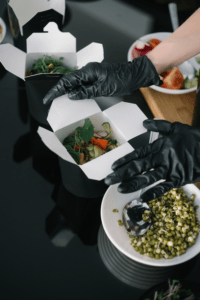
Food prepared away-from-home is typically served ready to consume and has become a major contributor to overall dietary intake.
In the USA, for example, food prepared away-from-home accounted for over 50% of total food expenditure in 2018. Third-party platforms that facilitate online ordering and delivery, referred to throughout as ‘online food delivery services’, provide an alternative mode of order that appears to have grown in popularity.
 In 2020, prominent online food delivery services Just Eat (including subsidiaries) and Uber Eats, were available in 13 countries, Deliveroo was available in 12 countries, and Grubhub was established in many cities across the USA. Online food delivery service availability has been forecast to increase, which could lead to greater use. In turn, this could increase the purchase and consumption of food prepared away-from-home.
In 2020, prominent online food delivery services Just Eat (including subsidiaries) and Uber Eats, were available in 13 countries, Deliveroo was available in 12 countries, and Grubhub was established in many cities across the USA. Online food delivery service availability has been forecast to increase, which could lead to greater use. In turn, this could increase the purchase and consumption of food prepared away-from-home.
In this study, researchers aimed to describe the prevalence and frequency of online food delivery service use, investigate associations between online food delivery service use and sociodemographic characteristics, and describe how online food delivery service customers used other modes of order to purchase food prepared away-from-home, in and across five upper-middle or high-income countries, and we will emphasize in the UK.
Method
This study used cross-sectional data from the International Food Policy Study (IFPS), conducted in Australia, Canada, Mexico, the UK, and the USA in November 2018. Briefly, data were collected via self-completed online surveys from adults aged 18 years or over, recruited through Nielsen Consumer Insights Global Panel and their partners’ panels.
Between-Country Variation
Respondents in Canada had lower odds of online food delivery service use compared to respondents in all other countries, whilst respondents in the UK and Mexico had greater odds compared to respondents in all other countries. Amongst online food delivery service customers in Australia, Mexico, and the USA, the median number of meals ordered through online food delivery services per person, was two, whereas in Canada and the UK, the median number, per person, was one.
There were significant between-country interactions. The association between online food delivery service use in the past 7 days and each of age, living with children aged under 18 years, sex, and education varied between countries. Odds of online food delivery service use in the past 7 days were lower per additional year of age amongst respondents in all countries. Respondents who lived with children aged under 18 years had greater odds of online food delivery service use in all countries, with the strongest association observed amongst respondents in the USA. There was no difference in odds of online food delivery service use by sex amongst respondents in Mexico, whereas males in all other countries had greater odds of online food delivery service use. Respondents with high (versus low) levels of education had greater odds of online food delivery service use in all countries except the UK.

Source: IJERPH | Free Full-Text | Use of Online Food Delivery Services to Order Food Prepared Away-From-Home and Associated Sociodemographic Characteristics: A Cross-Sectional, Multi-Country Analysis | HTML (mdpi.com)




 In 2020, prominent online food delivery services Just Eat (including subsidiaries) and Uber Eats, were available in 13 countries, Deliveroo was available in 12 countries, and Grubhub was established in many cities across the USA. Online food delivery service availability has been forecast to increase, which could lead to greater use. In turn, this could increase the purchase and consumption of food prepared away-from-home.
In 2020, prominent online food delivery services Just Eat (including subsidiaries) and Uber Eats, were available in 13 countries, Deliveroo was available in 12 countries, and Grubhub was established in many cities across the USA. Online food delivery service availability has been forecast to increase, which could lead to greater use. In turn, this could increase the purchase and consumption of food prepared away-from-home.
